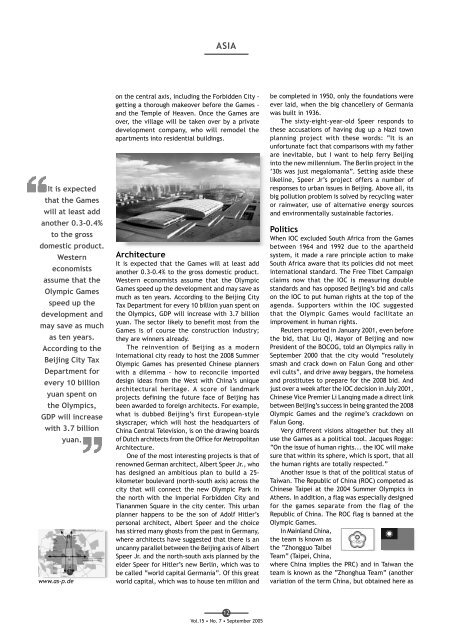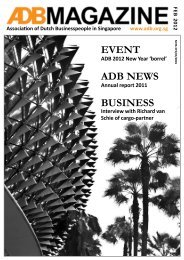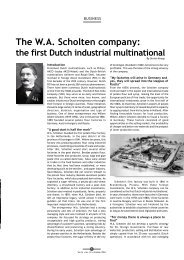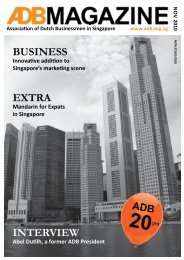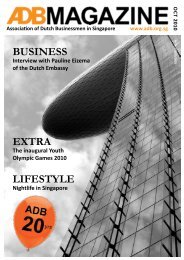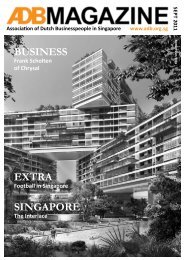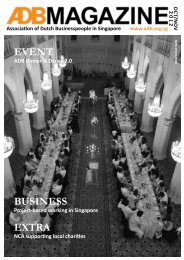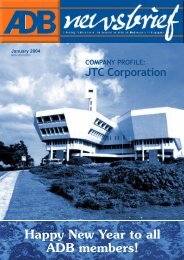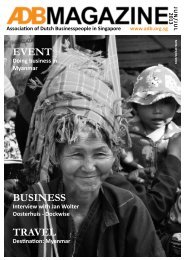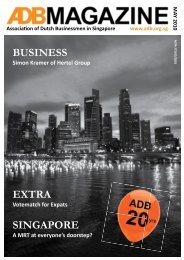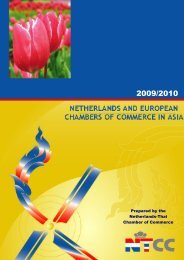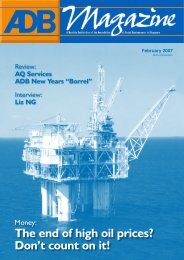Sept 2005 - Association of Dutch Businessmen
Sept 2005 - Association of Dutch Businessmen
Sept 2005 - Association of Dutch Businessmen
Create successful ePaper yourself
Turn your PDF publications into a flip-book with our unique Google optimized e-Paper software.
ASIA<br />
It is expected<br />
that the Games<br />
will at least add<br />
another 0.3-0.4%<br />
to the gross<br />
domestic product.<br />
Western<br />
economists<br />
assume that the<br />
Olympic Games<br />
speed up the<br />
development and<br />
may save as much<br />
as ten years.<br />
According to the<br />
Beijing City Tax<br />
Department for<br />
every 10 billion<br />
yuan spent on<br />
the Olympics,<br />
GDP will increase<br />
with 3.7 billion<br />
yuan.<br />
www.as-p.de<br />
on the central axis, including the Forbidden City -<br />
getting a thorough makeover before the Games -<br />
and the Temple <strong>of</strong> Heaven. Once the Games are<br />
over, the village will be taken over by a private<br />
development company, who will remodel the<br />
apartments into residential buildings.<br />
Architecture<br />
It is expected that the Games will at least add<br />
another 0.3-0.4% to the gross domestic product.<br />
Western economists assume that the Olympic<br />
Games speed up the development and may save as<br />
much as ten years. According to the Beijing City<br />
Tax Department for every 10 billion yuan spent on<br />
the Olympics, GDP will increase with 3.7 billion<br />
yuan. The sector likely to benefit most from the<br />
Games is <strong>of</strong> course the construction industry;<br />
they are winners already.<br />
The reinvention <strong>of</strong> Beijing as a modern<br />
international city ready to host the 2008 Summer<br />
Olympic Games has presented Chinese planners<br />
with a dilemma - how to reconcile imported<br />
design ideas from the West with China’s unique<br />
architectural heritage. A score <strong>of</strong> landmark<br />
projects defining the future face <strong>of</strong> Beijing has<br />
been awarded to foreign architects. For example,<br />
what is dubbed Beijing’s first European-style<br />
skyscraper, which will host the headquarters <strong>of</strong><br />
China Central Television, is on the drawing boards<br />
<strong>of</strong> <strong>Dutch</strong> architects from the Office for Metropolitan<br />
Architecture.<br />
One <strong>of</strong> the most interesting projects is that <strong>of</strong><br />
renowned German architect, Albert Speer Jr., who<br />
has designed an ambitious plan to build a 25-<br />
kilometer boulevard (north-south axis) across the<br />
city that will connect the new Olympic Park in<br />
the north with the Imperial Forbidden City and<br />
Tiananmen Square in the city center. This urban<br />
planner happens to be the son <strong>of</strong> Adolf Hitler’s<br />
personal architect, Albert Speer and the choice<br />
has stirred many ghosts from the past in Germany,<br />
where architects have suggested that there is an<br />
uncanny parallel between the Beijing axis <strong>of</strong> Albert<br />
Speer Jr. and the north-south axis planned by the<br />
elder Speer for Hitler’s new Berlin, which was to<br />
be called “world capital Germania”. Of this great<br />
world capital, which was to house ten million and<br />
be completed in 1950, only the foundations were<br />
ever laid, when the big chancellery <strong>of</strong> Germania<br />
was built in 1936.<br />
The sixty-eight-year-old Speer responds to<br />
these accusations <strong>of</strong> having dug up a Nazi town<br />
planning project with these words: “It is an<br />
unfortunate fact that comparisons with my father<br />
are inevitable, but I want to help ferry Beijing<br />
into the new millennium. The Berlin project in the<br />
’30s was just megalomania”. Setting aside these<br />
likeline, Speer Jr’s project <strong>of</strong>fers a number <strong>of</strong><br />
responses to urban issues in Beijing. Above all, its<br />
big pollution problem is solved by recycling water<br />
or rainwater, use <strong>of</strong> alternative energy sources<br />
and environmentally sustainable factories.<br />
Politics<br />
When IOC excluded South Africa from the Games<br />
between 1964 and 1992 due to the apartheid<br />
system, it made a rare principle action to make<br />
South Africa aware that its policies did not meet<br />
international standard. The Free Tibet Campaign<br />
claims now that the IOC is measuring double<br />
standards and has opposed Beijing’s bid and calls<br />
on the IOC to put human rights at the top <strong>of</strong> the<br />
agenda. Supporters within the IOC suggested<br />
that the Olympic Games would facilitate an<br />
improvement in human rights.<br />
Reuters reported in January 2001, even before<br />
the bid, that Liu Qi, Mayor <strong>of</strong> Beijing and now<br />
President <strong>of</strong> the BOCOG, told an Olympics rally in<br />
<strong>Sept</strong>ember 2000 that the city would “resolutely<br />
smash and crack down on Falun Gong and other<br />
evil cults”, and drive away beggars, the homeless<br />
and prostitutes to prepare for the 2008 bid. And<br />
just over a week after the IOC decision in July 2001,<br />
Chinese Vice Premier Li Lanqing made a direct link<br />
between Beijing’s success in being granted the 2008<br />
Olympic Games and the regime’s crackdown on<br />
Falun Gong.<br />
Very different visions altogether but they all<br />
use the Games as a political tool. Jacques Rogge:<br />
“On the issue <strong>of</strong> human rights... the IOC will make<br />
sure that within its sphere, which is sport, that all<br />
the human rights are totally respected.”<br />
Another issue is that <strong>of</strong> the political status <strong>of</strong><br />
Taiwan. The Republic <strong>of</strong> China (ROC) competed as<br />
Chinese Taipei at the 2004 Summer Olympics in<br />
Athens. In addition, a flag was especially designed<br />
for the games separate from the flag <strong>of</strong> the<br />
Republic <strong>of</strong> China. The ROC flag is banned at the<br />
Olympic Games.<br />
In Mainland China,<br />
the team is known as<br />
the “Zhongguo Taibei<br />
Team” (Taipei, China,<br />
where China implies the PRC) and in Taiwan the<br />
team is known as the “Zhonghua Team” (another<br />
variation <strong>of</strong> the term China, but obtained here as<br />
12<br />
Vol.15 • No. 7 • <strong>Sept</strong>ember <strong>2005</strong>


